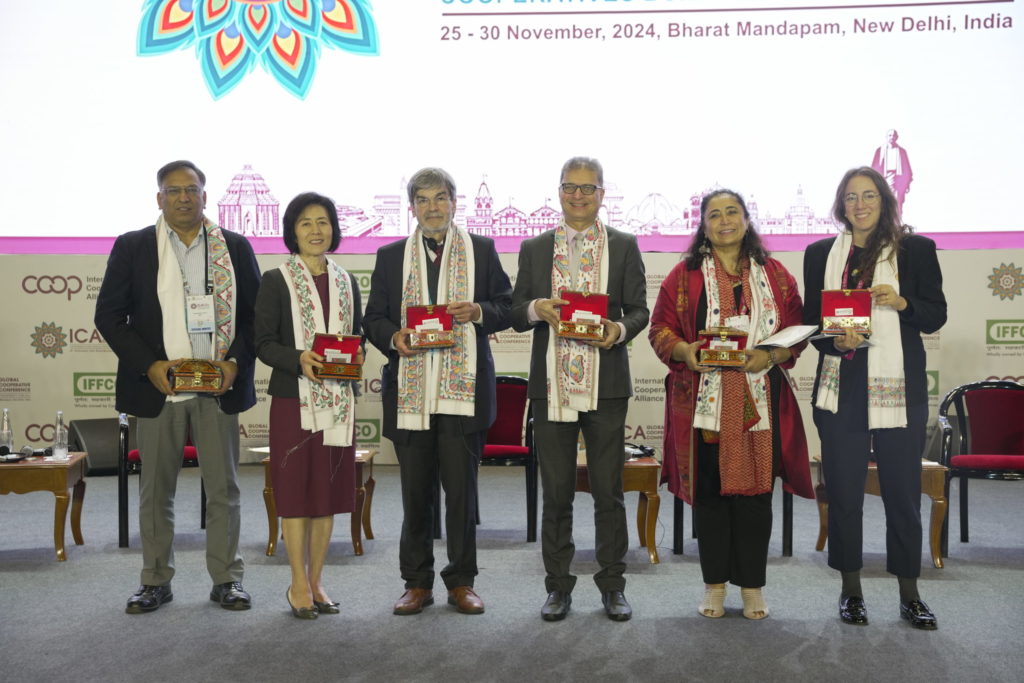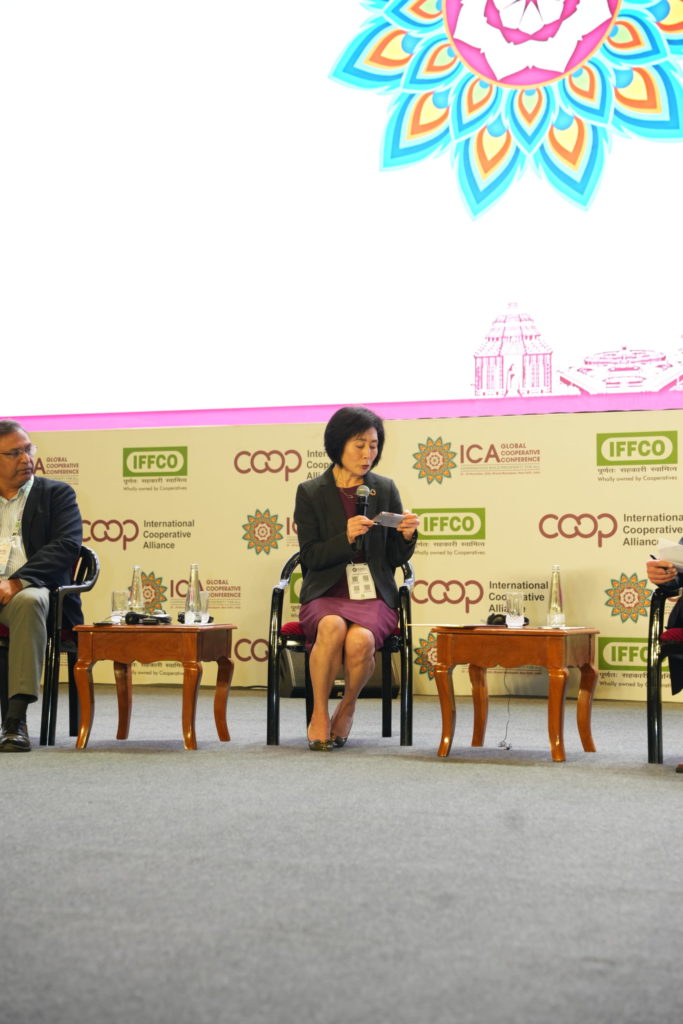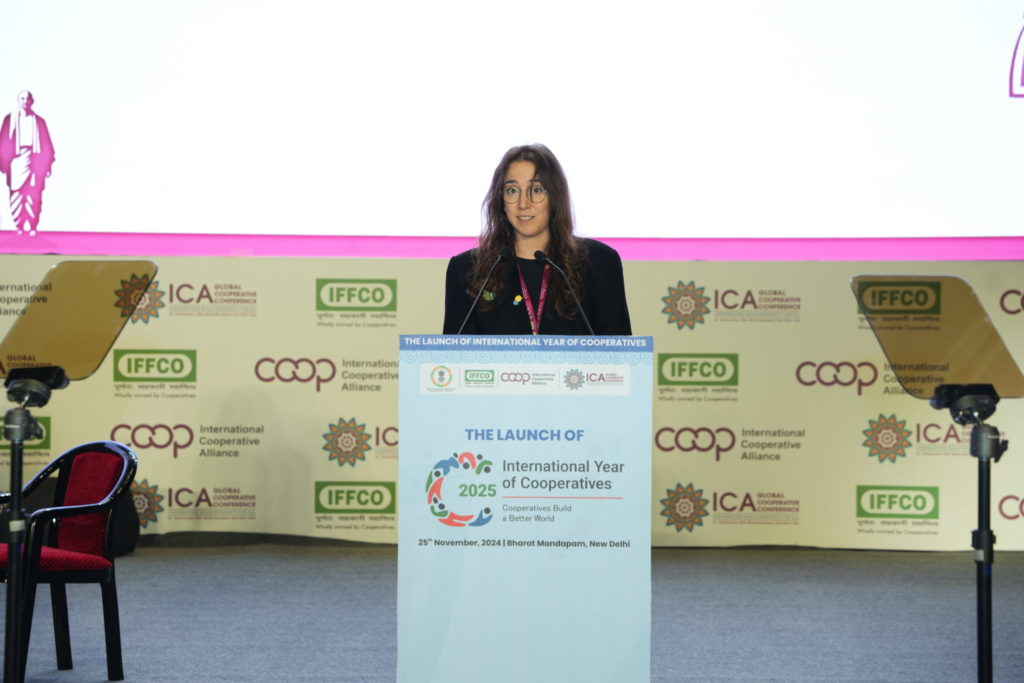As part of the ICA Global Conference held in New Delhi, India, the session on Institutional Support for Cooperative Development brought together leading experts from international organizations to discuss how policy, law, and institutional collaboration can create enabling environments for cooperatives.

The panel was a key segment of the broader discussion on “Enabling Policy and Entrepreneurial Ecosystems,” a critical theme of the conference aimed at advancing cooperative resilience and growth in the face of global challenges. Moderated by Professor Hagen Henry, Chairperson of the ICA Cooperative Law Committee, it featured panelists representing major institutional actors and COPAC members: ILO, UN DESA, FAO, and ITC. The discussion focused on the role of institutional frameworks in fostering sustainable cooperative ecosystems and explored synergies between cooperative movements and international policy initiatives.
The session emphasized the importance of policy and legal frameworks, institutional collaboration, and practical mechanisms that ensure cooperatives thrive within entrepreneurial ecosystems. Discussions underscored the need for robust institutional support to enable cooperatives to respond to global challenges and contribute to inclusive, sustainable development.
Ms Wenyan Yang, Chief of the Social Perspective on Development Branch at UN DESA and Chair of The Committee for the Promotion and Advancement of Cooperatives (COPAC), provided insights on the UN’s role in advancing cooperatives, highlighting the 2023 UN Secretary-General’s report on cooperatives’ entrepreneurial ecosystems. She outlined four critical elements essential to cooperatives: Rules and regulations; Administrative services and infrastructure; Access to finance; and Business networks and markets.
Ms Yang emphasized how cooperatives can capitalize on the International Year of Cooperatives in 2025 by engaging in key processes throughout the year, such as the World Social Summit, the Commission for Social Development, and the High-Level Political Forum (HLPF).
“Our work at UN DESA and COPAC focuses on advocating for cooperatives within the UN system. We try to raise awareness and advocate for cooperative issues in the General Assembly and similar bodies, but to do so, we need a consolidation of evidence and empirical data.”
Ms Simel Esim, Manager of the ILO Cooperative, Social and Solidarity Economy (SSE) Unit, highlighted the organization’s long-standing support for cooperative development. She stressed the need for policy uptake and buy-in, urging a focus on implementation mechanisms and connecting established cooperative sectors with emerging ones, including those led by youth and women. Ms Esim also drew attention to the ILO’s 2022 International Labour Standards recommendation, adopted by over 120 countries, and the ongoing work to operationalize UN and ILO resolutions on the SSE.
Ms Cécile Berranger, Rural Institutions and Services Specialist at the FAO, spoke to the challenges smallholder farmers, women, and youth face due to climate change and economic marginalization. She emphasized the empowering role of cooperatives in building resilience and reducing inequalities. She called for capacity building at the grassroots level, referencing training tools like My.COOP for agricultural cooperative management, developed by the ILO and FAO in partnership with other institutions, alongside improved access to finance, education, and collaborative opportunities.

Dr Ashish Shah, Director of the Division of Country Programmes at the International Trade Centre (ITC), contextualized the panel within global crises – the 4Cs: COVID-19, climate change, the cost-of-living crisis, and conflict. He positioned cooperatives as a transformative solution, offering innovation, collaboration, and advocacy as pathways to sustainability and resilience. Dr. Shah highlighted the significance of the International Year of Cooperatives 2025 (IYC 2025) in driving these initiatives forward.
Panel Outcomes:
The session identified key areas for institutional collaboration and innovation, including:
- The importance of aligning cooperative development strategies with broader policy goals like the SDGs and the IYC 2025.
- Strengthening multi-stakeholder engagement and leveraging synergies between institutional actors, such as government agencies, international organizations, and cooperative movements.
- Building capacity at all levels to ensure policies translate into tangible outcomes for cooperatives and their members.
Panelists collectively agreed on the need to reduce over-reliance on the state by harnessing broader ecosystems, including private sector actors and NGOs, to enhance resilience and mitigate political risks. This session was one of many with COPAC members’ participation throughout the week. For further updates follow COPAC on LinkedIn and X.

